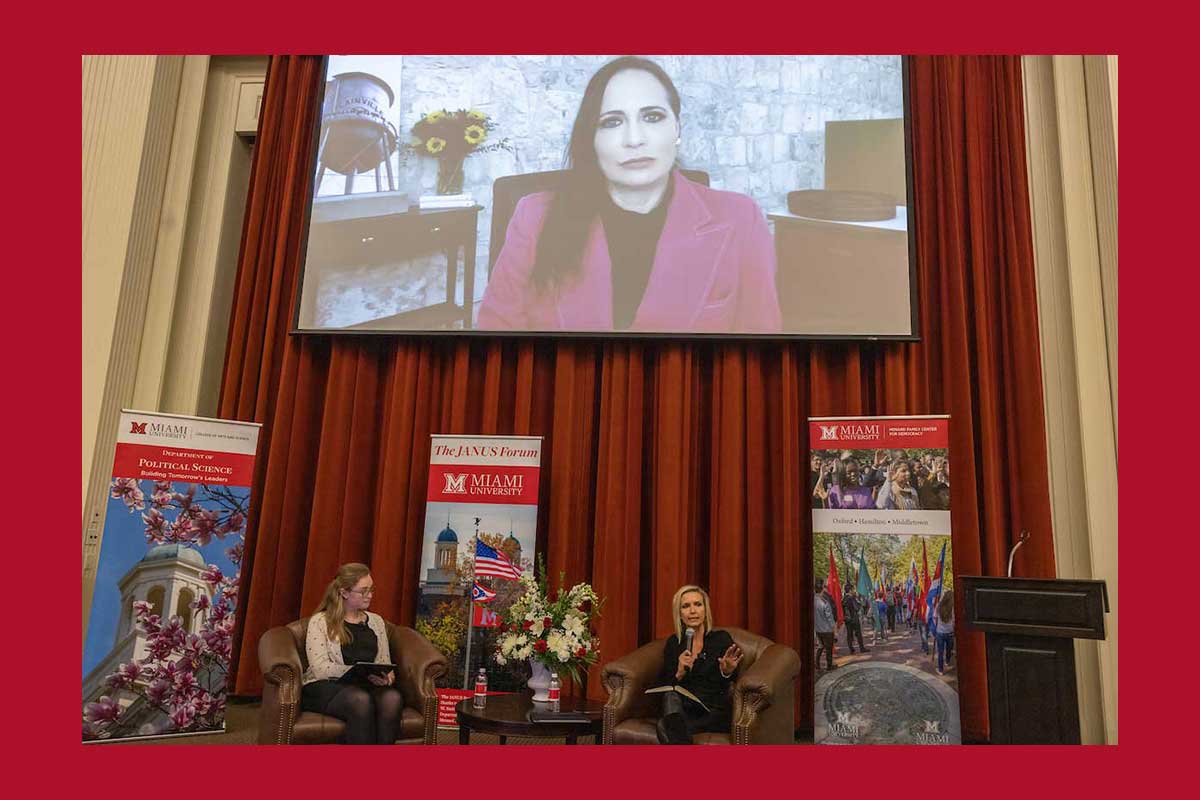Bipartisan debate on the overturning of Roe v Wade reveals the consequences of divided government in the United States
Stephanie Grisham and Johanna Maska discuss how the overturning of Roe v Wade affects more than access to abortion.

Bipartisan debate on the overturning of Roe v Wade reveals the consequences of divided government in the United States
On November 15, Miami University's Janus Forum invited two speakers, Stephanie Grisham and Johanna Maska, who engaged in a spirited yet amicable discussion about opposing viewpoints on what the overturning of Roe v Wade signifies.
The event, “Life After Roe: What Happens Next?” was held in Taylor Auditorium and sponsored by the Department of Political Science and the Menard Center of Democracy via support from Thomas W. Smith ‘50. Moderated by Cameron Tiefenthaler, the Janus Forum welcomed questions submitted via Twitter.
Grisham, who served in the Trump administration, and Maska, who served in the Obama administration, spoke about what the overturning of Roe v Wade means for the future of America.
The forum began with opening statements in which Maska and Grisham shared opposing views but acknowledged commonalities.
“People I love and respect are on different sides,” said Grisham, but off the bat she made it clear that her stance is pro-life.
Maska added that the right to choose is “such a personal decision that they will live with the rest of their lives,” but, “we don’t have the context of all these decisions.”
How does this affect what can be regulated?
Grisham acknowledged how important it is to support mothers. Her experience with helping women leave abusive relationships helped to broaden her perspective.
“The issue of abortion first and foremost should be discussed by women,” she said. “We need to be forced to have this conversation of when a child in the womb has rights. Again, I think that’s when Democrats and Republicans need to come together.”

student moderator Cameron Tiefenthaler looks on.
“I think we need to get out what people are saying behind closed doors,” Maska said. “To me, it’s a family planning and government power issue.”
Therefore, she continued, it also calls into question what the government has the right to regulate, including contraception and gay marriage as well as the ethics of capital punishment and poverty.
This statement drew a counter from Grisham. “I think that comparing [abortion] to the death penalty is very different,” she said. “These are different women, different life circumstances. I don’t think poverty is an issue there. I think we should empower people who are pregnant whose future is uncertain due to poverty.”
“What do we do to rehabilitate people in our country that have been victims?” Maska asked. “We have 400,000 people in foster care in the U.S. There are so many times people talk about being pro-life, and yet we are not supporting the life that has been born and struggling in our country.”
Furthermore, Maska took the stance of being against capital punishment, saying, “it is us playing God…I’m of the mindset that the government needs to be that fair arbiter.”
Bottom line, the division within government is the biggest issue.
As the abortion debate goes on, there is more talk about how divided the government is. Maska stated how abortion has been used as a “political football,” which has furthered general fustration.
“We need to humanize people,” Grisham said in response. “There are so many different situations, and we need to take away the stigma of shame.”
“So many have had this trial in their own family, that when someone tells you they are not ready to be a parent, believe them,” Maska said.
Americans are expected to side with everything one party says, despite nuances, Maska added. She believes that although abortion is a conversation that should be led by women, it is not strictly a women’s issue.
Grisham agreed that the responsibility falls onto women. “I do believe our country is tired of a divided government,” she said.
“If we want our freedom, we can’t afford to be tired,” Maska said. “It will take all of us to show up for equality.”